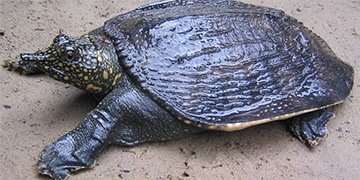Context
-
A major temple in Assam has signed a memorandum of understanding with two green NGOs, the Assam State Zoo cum Botanical Garden and the Kamrup district administration for long-term conservation of the rare freshwater black softshell turtle (Nilssonia nigricans).
- A vision document 2030 was also launched after Turtle Survival Alliance India and Help Earth signed the pact involving the Hayagriva Madhava Temple Committee.
About Black softshell turtle
- Until sightings along the Brahmaputra River’s drainage in Assam, the black softshell turtle was thought to be ‘extinct in the wild’ and confined only to ponds of temples in northeastern India and Bangladesh.

- IUCN: Critically Endangered
- Does not enjoy legal protection under the Indian Wildlife (Protection) Act of 1972 although it has traditionally been hunted for its meat and cartilage, traded in regional and international markets.
- CITES: Appendix I
- Various temple ponds in Assam such as that of the Hayagriva Madhava Temple harbour various threatened species of turtles.
- Since the turtles are conserved in these ponds only based on religious grounds many biological requirements for building a sustainable wild population have since long been overlooked.
- The black softshell turtle is a freshwater species and there are 29 species of freshwater turtles and tortoises found in India.
- Under the Wildlife Protection Act of 1972, all sea turtles are a protected species. But people still poach them. As the black softshell turtle is the biggest in terms of size, it is targeted due to its abundance of meat.
- In India, the five turtle priority areas are the Chambal and Yamuna landscapes, the Indo Nepal Himalayan Terai, Eastern India (Sundarbans and Odisha), the Brahmaputra river system landscape and the Western Ghats.
Environment Current Affairs : Click here
